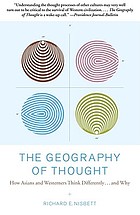preparations for 30 September session

Read these
Nisbett, R. E. (2004). The geography of thought: How Asians and Westerners think differently – and why. New York: Free Press.
-
Is the World Made Up of Nouns or Verbs?:
Categories and Rules vs. Relationships and Similarities,
p. 137 through 163 -
"Ce N'est Pas Logique" or "You've Got a Point There"?:
Logic and the Law of Noncontradiction vs. Dialectics and the Middle Way,
p. 165 through 190
Think about these issues
... in the basic scheme the ancient Chinese had for the world ... the world consisted of continuous substances. So it was a part-whole dichotomy that made sense to them ...
Since the Greek world was composed of objects, an individual-class relationship was natural to them.
Does this observation translate into the basic way you view the world, here in the early 21st century?
The obsession with categories of the either/or sort runs through Western intellectual history.
Does your experience with cataloging or archival records keeping validate or invalidate this statement?
Do you know enough about any second language to be able to comment intelligently on these statements:
... is it possible that it is merely language that is driving the differences in tendency to organize the world in terms of verbs vs. nouns?
Western languages force a preoccupation with focal objects as opposed to context. English is a "subject-prominent" language.
... the differences in linguistic structure between languages are reflected in people's habitual thinking processes.
There appears to be noting about the structure of language, though, that actually forces description in terms of categories versus relationships.
... the spirit of logical inquiry (has) always been common in the West ... the best explanation for the Greeks' concern with logic is that they saw its utility in argumentation ... the Chinese remain far more committed to reasonableness than to reason.
Do you feel like you know enough to agree or disagree with this statement?

